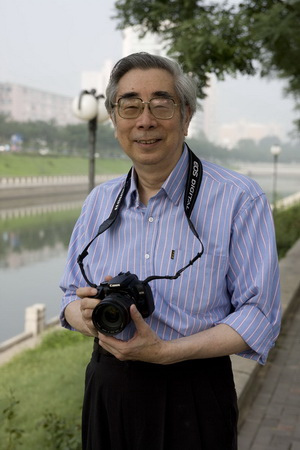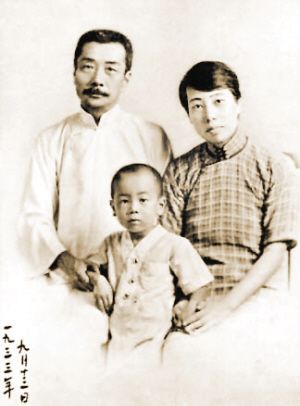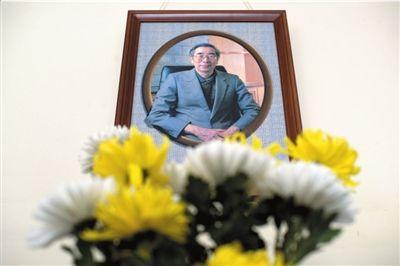News & Events | About PKU News | Contact | Site Search
Peking University, Apr. 8, 2011: Zhou Haiying, an expert in radio communications and the only child of Lu Xun and Xu Guangping, passed away on the morning of April 7 in Beijing. He was 81.

Zhou Haiying (1929-2011)
Zhou Haiying was born in 1929 in Shanghai, so his father gave him this name "Haiying" - a Shanghai child. However, Zhou has always been recognized as “Lu Xun’s child.”
Lu (1881-1936), the most prominent Chinese writer in the 20th century, said in his testament that he didn't want his children to be nominal writers, which greatly affected Zhou Haiying. Zhou studied at the PKU Department of Physics from 1952 to 1960 and became a radio expert later in his life. He served as director of the Chinese Institute of Electronics, working for radio and television programming.
Though he was not willing to live under the prestige of his father, he still did much work on memorizing and studying Lu Xun. He wrote many books about his father, among which the most famous one was Lu Xun and Me in 70 Years. He was also editor-in-chief of Memoir of Lu Xun, contributing to the complete appearance of the manuscript to the public.
In recent years, Zhou Haiying raised attention of the media not because his love in photography nor work on radio, but his proposals and speeches about publishing, cultural industry, and youth education. He once said, “We should use our own achievements in work to win the acknowledging of society.”
The farewell ceremony will be held on April 11 at the Babaoshan Revolutionary Cemetery.

Lu Xun, Xu Guangping, and Zhou Haiying in 1933 (File photo)
"I live with my father every day"
Zhou Haiying once said that his parents never forced him and let the nature take its course. When he was a little boy, he got interests in a toy made up of many metal materials, with which he assembled little train and crane on his own. Lu Xun always encouraged him. Though the family financial situation once became bad after Lu Xun's death, Zhou Haiying never lost interests in technology and even used his gift money to pay tuition fee to study mechanics. Finally, he went to Peking University and started his rigorous research life.
Zhou Haiying was only 7 when Lu Xun died, the rough growing experience and special family background made him especially cautious to deal with everything. When he studied at PKU, he went to see classmates playing bridge cards and ballroom dancing occasionally, but there were someone saying gossips about this," Lu Xun's son doesn't study and the only thing he does is play card and dance.” Zhou Haiying acknowledged that he only wanted to be an ordinary person and thought little about fame and wealth.
"He did things in a similar way as his father," Wang Xirong, curator of Lu Xun Memorial Hall in Shanghai and also an acquaintance of Zhou Haiying, said that not only his look but also the voice extremely resembles his father's.
The manuscript of Memoir of Lu Xun written by Xu Guangping was found in 2008, when Zhou Haiying was already 79. But he insisted that he revise the manuscript himself. "He revised word by word and tried best to restore history. His persistence showed the work style of his father," said Wang.
Zhou Haiying wrote in the book Lu Xun and Me in 70 Years: "I live every day with my father all through these 70 years.” In his later years, Zhou must go to the former residence every time he went back to Shanghai. He and his wife visited Lu Xun's grave every year.
"I am opposed to living on parents and also living a meaningless life. We should use our own achievements in work to win the acknowledging of society." That’s what Zhou Haiying said and also how he did throughout his life.

Zhou Haiying's photographic work recording the Chinese democrats at the liberated area at the dawn of the New China (File photo/ChinaNews.com)
"His photos reflect the transition of society"
It seemed that Zhou Haiying was tightly bond with photography since his early childhood. When he was only 100-day-old, Lu Xun took him to a studio to take photos, which was mentioned in some articles of Lu Xun. Zhou Haiying got passion in taking photographs when he was only 8. Though once enduring a hard time, his mother Xu Guangping tightened her belt to buy a camera for him, making it possible for him to take photos of the 1940s and 1950s.
His photos focused on the important moments in history as well as the poor people living in the bottom of society. He has taken over 20,000 photos, in which there are many treasures of history. For example, he used his camera to record life moments of many prominent personages in 1948 who contributed greatly to the construction of the New China, making up for the margin of political archives and becoming the only record to witness the significant time. On the other hand, his photos recorded the living conditions and environment of common people, like his photo series Refugee. He got close to his photo objectives emotionally, instead of seeking novelty in a high position, that's why he could capture many fresh and vigorous moments casually.
"I live through the old society and I am sensitive to social situations and public opinions. I don't want to seek novelty, but to offer proof of current affairs," Zhou Haiying once interpreted.
Li Shufeng, editor-in-chief of Chinese Photographers, has written some articles to comment on Zhou Haiying's work. In his eyes, these photos are of high value of history literature because they were taken since 1942 without interruption and recorded the rangy social life, from unknown vagrants to prominent celebrities, from beautiful village to bombed city, from naughty children to lonely olds, to name a few. They are just the shadows of piles of things, but they do prove their existence and have much information, making them of great value without doubt.
“He used his camera to keep pace with the times and his photos reflect the transition of society. No matter how the times change, he never changed his mind, that is, to focus on life with common mind and take photograph with leisure attitude," commented Li.
"He can afford the title of the son of Lu Xun,” Zhao Lihong, vice chairman of Shanghai Writers' Union, said in an interview. “He cannot choose to be the son of Lu Xun or not. It is his noble characteristics that make him respectable."
Zhou Haiying's quotes
About Reading: “People should pay much attention to reading even in an information era. I agree on seeking information through Internet and mobile phones, but reading is still extremely important. Seeing is just browsing, which is totally different from reading. We can add some annotates when we read and onetime reading is far from enough."
About Culture: “I agree with the opinion that every financial crisis gives an opportunity for cultural boom. The prosperous of culture needs the efforts of whole society and government. The ticket price should be lower, making it possible for ordinary people to enjoy art edification. Dialect is an important part of both culture and language. Local broadcasting stations should add some dialect programs and persist on doing so."
About Writing: “Nowadays, youths write little words from heart, leaving only fake, large and null words. The problem in writing is related with that in reading. Under the circumstance of exam-orientated education, students give up reading the classics and concentrate on the 'composition' tactics. Youngsters should use their eyes to watch society and gain more life experiences."

Zhou Haiying's portrait (ChinaNews.com)
Family
Lu Xun, Zhou Haiying’s father, was among leading Chinese writers who helped bring Chinese literature into the modern era with novels including The True Story of Ah Q and A Madman's Diary.
Lu Xun's real name was Zhou Shuren.
Zhou Haiying has a daughter living in Japan, and his eldest son, Zhou Lingfei, lives in Taiwan.
Written by: Chen Meng
Edited by: Jacques
Source: Agencies